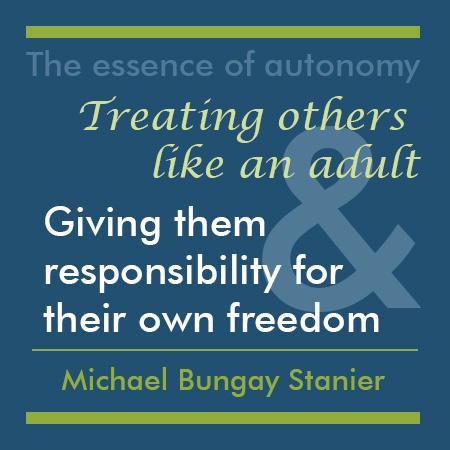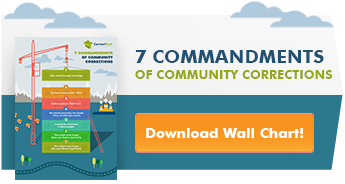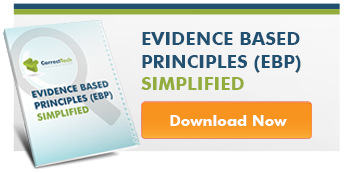We corrections professionals love to drop the r-bomb. I’m not talking about responsivity, although it is a critical component of EBP that is often neglected if not outright ignored. I’m talking about RISK, that four-letter word that precedes need every time we talk about supervising justice-involved individuals. Assessing criminogenic risk is fundamental to our mission; that’s a given. But what message do we send when we say someone is high risk? Are we poisoning the well, compounding the stigma, and adding barriers to achieving those other coveted “r-words” - rehabilitation, reintegration, and recidivism reduction?
Read MoreRisk: A “Four-Letter Word”
Posted by Harris Childers on 5/30/19 10:06 PM
Topics: Evidence Based Practices, Risk Principle, responsivity, risk, EBP, Criminal Justice Reform
What IS Community Corrections?
Posted by Lisa Sayler on 5/9/19 11:41 PM
When you hear the words Community Corrections what is the first thing you think of?
As a Community Corrections veteran of a residential program in Colorado, when someone asks me what community corrections is…my first response is, you may have heard it called a “halfway house”. And very egocentrically, I assumed that’s what it meant for everyone who said, “community corrections”. While I worked alongside probation and parole previously, when I started to work for CorrectTech I learned much more about what community corrections first means to others in the field and some minor differences and similarities in all the different shapes, sizes, and flavors of community corrections. I found it very interesting…maybe you will too.
Read MoreTopics: Community Corrections, Community Corrections Professional
To test, or not to test, that is the question. Or is it?
Posted by Harris Childers on 4/26/19 4:03 AM
The Philly debate questioned the legitimacy and fairness of testing for a legal substance, and punishing those who obtain it through illegal means, while giving a pass to persons who have the means to obtain a physician’s legal prescription. The dividing line between these two groups? Race and class. If marijuana is legal, why test for it at all? Eliminating testing for a legal substance might be a partial solution to ending bias and discrimination, but is it the best response? Read More
Topics: opiod testing, drug testing, marijuana testing, Brian Lovins
5 Reasons to go Paperless
Posted by Lisa Sayler and Beth Bond on 4/11/19 9:32 AM
You might wonder if going paperless is all it’s cracked up to be. Can your agency truly go paperless? Is anything really paperless? The answer is yes and no. Yes, there are plenty of companies who now go paperless every day. However, in the world of community corrections we know the truth. Into everyone’s life a little paper must fall.
Read MoreTopics: reentry, paperless office, money savings, staff productivity, going paperless
The Foundation of Coaching: Respecting Autonomy
Posted by Evan C. Crist, Psy.D. on 9/13/18 7:44 PM
The first three questions of The Coaching Habit: Say Less, Ask More & Change the Way You Lead Forever that are discussed Kickstarting a Coaching Session, Coaching with the AWE Question, and The Coaching Habit of Creating Focus, work together to create focus and define what the client sees as the central problem. As we have discussed earlier, it is tempting to believe that your work is primarily done once the problem is solved. The Advice Monster will see a clear definition of the problem as an opportunity to solve it, look brilliant and move on to the next problem. No patience, process or angst required. Most of us went into this field due to our passion to help others. Somehow along the way, we learned that helping others means attempting to solve problems for them. Well intentioned but well off the mark. “What is the real challenge here for you?” isn’t the beginning of the end, it is the end of the beginning. The first half of the coaching process is defining the problem. The second half is identifying the solution. That process begins with a simple (but not easy) question?
Read MoreTopics: The Coaching Habit, Michael Bungay Stanier, Evan C. Crist, coaching community corrections clients
Subscribe To Our Blog
Recent Posts
Posts by Topic
- Community Corrections (63)
- Evidence Based Practices (44)
- Community Corrections Professional (23)
- Software (15)
- Practices (12)
- Change (11)
- Technology (10)
- Risk Principle (8)
- reentry (8)
- probation staff (7)
- EBP (6)
- Outcomes (6)
- client development (6)
- client needs and values (6)
- coaching community corrections clients (6)
- Assessment (5)
- Community (5)
- Developing a practice model (5)
- Justice-Involved Clients (5)
- Remote work (5)
- The Coaching Habit (5)
- parole (5)
- risk (5)
- tele-supervision (5)
- tele-work (5)
- Community Engagement (4)
- Evan C. Crist (4)
- Community Corrections Client Services (3)
- Criminal Justice Reform (3)
- Implementation (3)
- Listening Skills (3)
- Motivational Interviewing (3)
- Policy (3)
- Positive Reinforcement (3)
- Practice Models (3)
- high risk client (3)
- reaching clients emotions (3)
- responsivity (3)
- Addiction (2)
- BOP (2)
- Conferences (2)
- ICCA (2)
- Management (2)
- Michael Bungay Stanier (2)
- Relapse Prevention (2)
- halfway house (2)
- jic (2)
- paperless office (2)
- principles (2)
- procedures (2)
- program results (2)
- APPA (1)
- Appreciative Thinking (1)
- Brian Lovins (1)
- COVID-10 (1)
- Community Connection (1)
- Coronavirus (1)
- Crisis (1)
- Customer Service (1)
- Data Management (1)
- Fidelity (1)
- ICCA Seattle (1)
- Juvenile Corrections (1)
- Leadership (1)
- Monitor History (1)
- Opioid Addiction (1)
- Opioid Crisis (1)
- Orange is the New Black (1)
- Program Data (1)
- Reforms (1)
- Relapse (1)
- Second Chances (1)
- Switch by the Heath Brothers (1)
- Treatment (1)
- drug testing (1)
- going paperless (1)
- govcio outlook (1)
- impact sessions (1)
- innovation (1)
- intrinsic motivation (1)
- justice reinvestment (1)
- marijuana testing (1)
- money savings (1)
- opiod testing (1)
- purpose (1)
- remote working (1)
- resources (1)
- sanction (1)
- staff productivity (1)
- technology solutions provider (1)
- the awe question (1)
- what works (1)
- what's on your heart (1)
- work from home (1)







